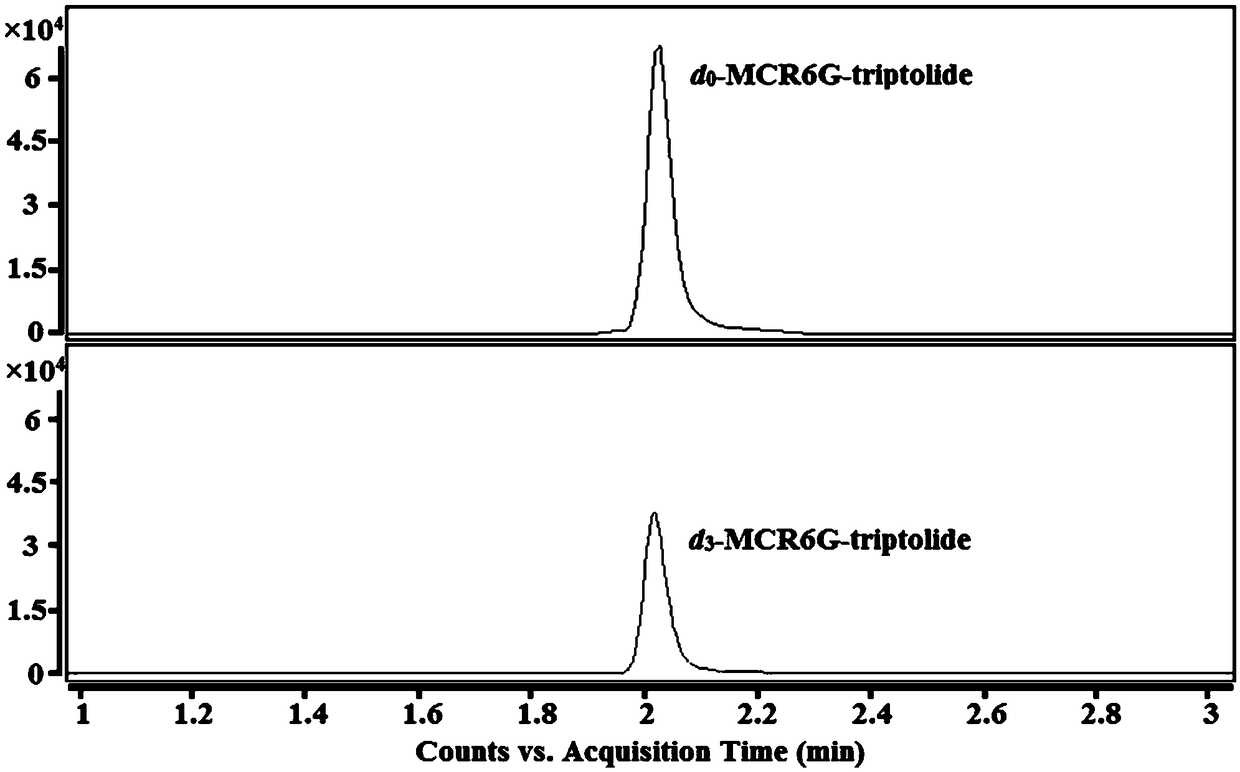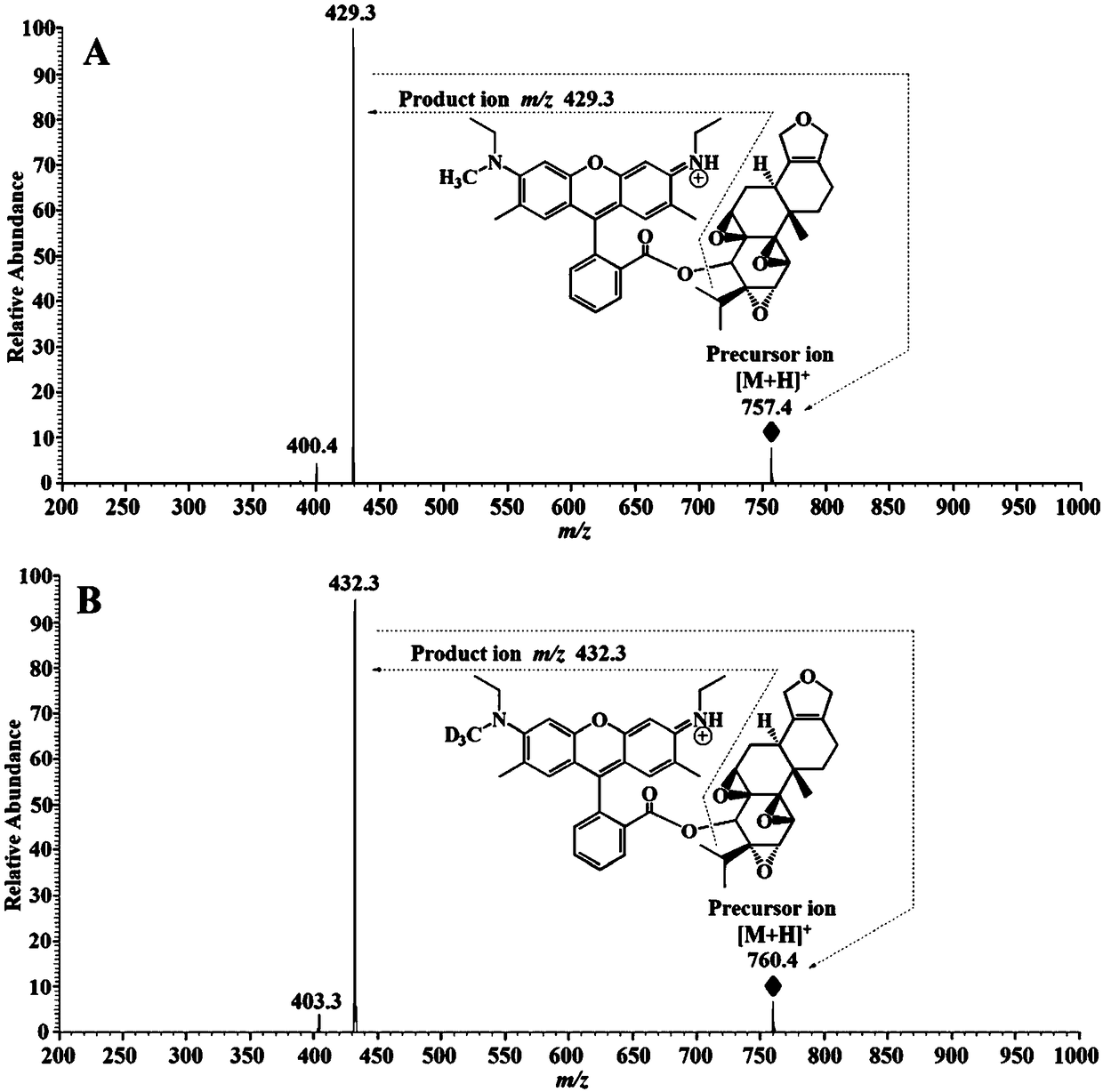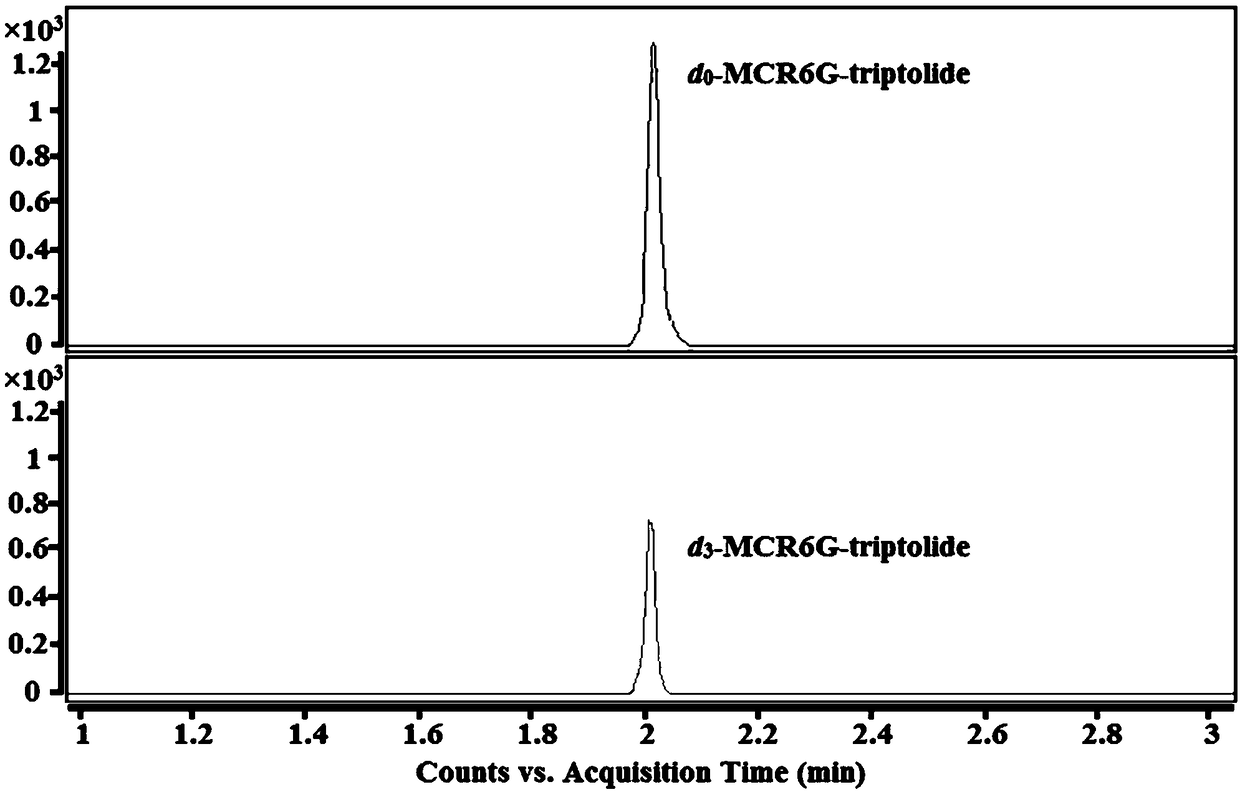Detection and analysis method for trace triptolide in biological sample
A technology for triptolide and an analysis method, which is applied in the field of detection and analysis of trace amounts of triptolide in biological samples, can solve the problems of low content, urgent need to improve accuracy and mass spectrometry ionization efficiency, matrix interference, etc., and achieves recovery rate High, overcoming long derivatization reaction time, reducing the effect of matrix interference
- Summary
- Abstract
- Description
- Claims
- Application Information
AI Technical Summary
Problems solved by technology
Method used
Image
Examples
Embodiment 1
[0040] Chromatographic separation and mass spectrometry qualitative and quantitative analysis methods of triptolide:
[0041] In the range of 3-5000 pg / mL, prepare 7 different concentrations d 0 - MCR6G labeled triptolide standard solution (20pg / mL, 400 pg / mL, 800 pg / mL, 1500 pg / mL, 2000 pg / mL, 3000 pg / mL, 4000 pg / mL), where d 3 -MCR6G-labeled standard (2500 pg / mL) was used as fixed internal standard. The specific derivatization process is as follows: 1 part of the above-mentioned standard solution with different concentration levels, 25 μL CMPI (7 wt%) and 25 μL DMAP (10.5 wt%) acetonitrile solution, 150 μL d 0 -MCR6G or d 3 - MCR6G acetonitrile solution, add to a 1.5 mL centrifuge tube one by one, vortex for 10 seconds. Seal and react in a microwave reactor (840 W) at 56 °C for 6.5 min. 7 levels of concentration d 0 -MCR6G standard derivative and d 3 -MCR6G-labeled immobilized standard derivatives 1:1 respectively ( V / V ) to mix and shake well. The magnetic dis...
Embodiment 2
[0046] The extraction of triptolide in the brain microdialysate comprises the following steps:
[0047]Take 200 μL of rat brain microdialysate into a centrifuge tube, blow dry with nitrogen, and redissolve the residue in 200 μL of acetonitrile for stable isotope labeling derivatization. Take 50 µL brain microdialysate acetonitrile reconstituted solution or standard solution, 25 µL CMPI (8 wt%) and 25 µL DMAP (15 wt%) acetonitrile solution, 150 µL d 0 -MCR6G or d 3 - MCR6G acetonitrile solution, add to a 1.5 mL centrifuge tube one by one, vortex for 10 seconds. Seal and react in a microwave reactor (850 W) at 60 °C for 6.5 min. d 0 -MCR6G-labeled brain microdialysate and d 3 -MCR6G labeled standard 1:1 ( V / V ) to mix and shake well. Disperse 10 mg of magnetic molecularly imprinted polymer into the above mixed solution and shake for 60 minutes. Magnetic separation, the adsorbed d 0 -MCR6G- triptolide derivative desorbed down. Magnetically separated and blown dry wit...
Embodiment 3
[0049] The extraction of triptolide in the hemodialysate comprises the following steps:
[0050] Take 200 μL of rat blood microdialysate into a centrifuge tube, blow dry with nitrogen gas, and redissolve the residue in 200 μL of acetonitrile for stable isotope labeling derivatization. Take 50 µL hemodialysate acetonitrile reconstitution solution or standard solution, 25 µL CMPI (7 wt%) and 25 µL DMAP (14 wt%) acetonitrile solution, 100 µL d 0 -MCR6G or d 3 - MCR6G acetonitrile solution, add to a 1.5 mL centrifuge tube one by one, vortex for 10 seconds. Seal and react in a microwave reactor (820 W) at 57 °C for 6 min. d 0 -MCR6G-labeled hemodialysate and d 3 -MCR6G labeled standard 1:1 ( V / V ) to mix and shake well. Disperse 12 mg of magnetic molecularly imprinted polymer into the above mixed solution and shake for 60 minutes. Magnetic separation, the adsorbed d 0 -MCR6G- triptolide derivative desorbed down. Magnetically separated and blown dry with nitrogen. The ...
PUM
 Login to View More
Login to View More Abstract
Description
Claims
Application Information
 Login to View More
Login to View More - R&D
- Intellectual Property
- Life Sciences
- Materials
- Tech Scout
- Unparalleled Data Quality
- Higher Quality Content
- 60% Fewer Hallucinations
Browse by: Latest US Patents, China's latest patents, Technical Efficacy Thesaurus, Application Domain, Technology Topic, Popular Technical Reports.
© 2025 PatSnap. All rights reserved.Legal|Privacy policy|Modern Slavery Act Transparency Statement|Sitemap|About US| Contact US: help@patsnap.com



